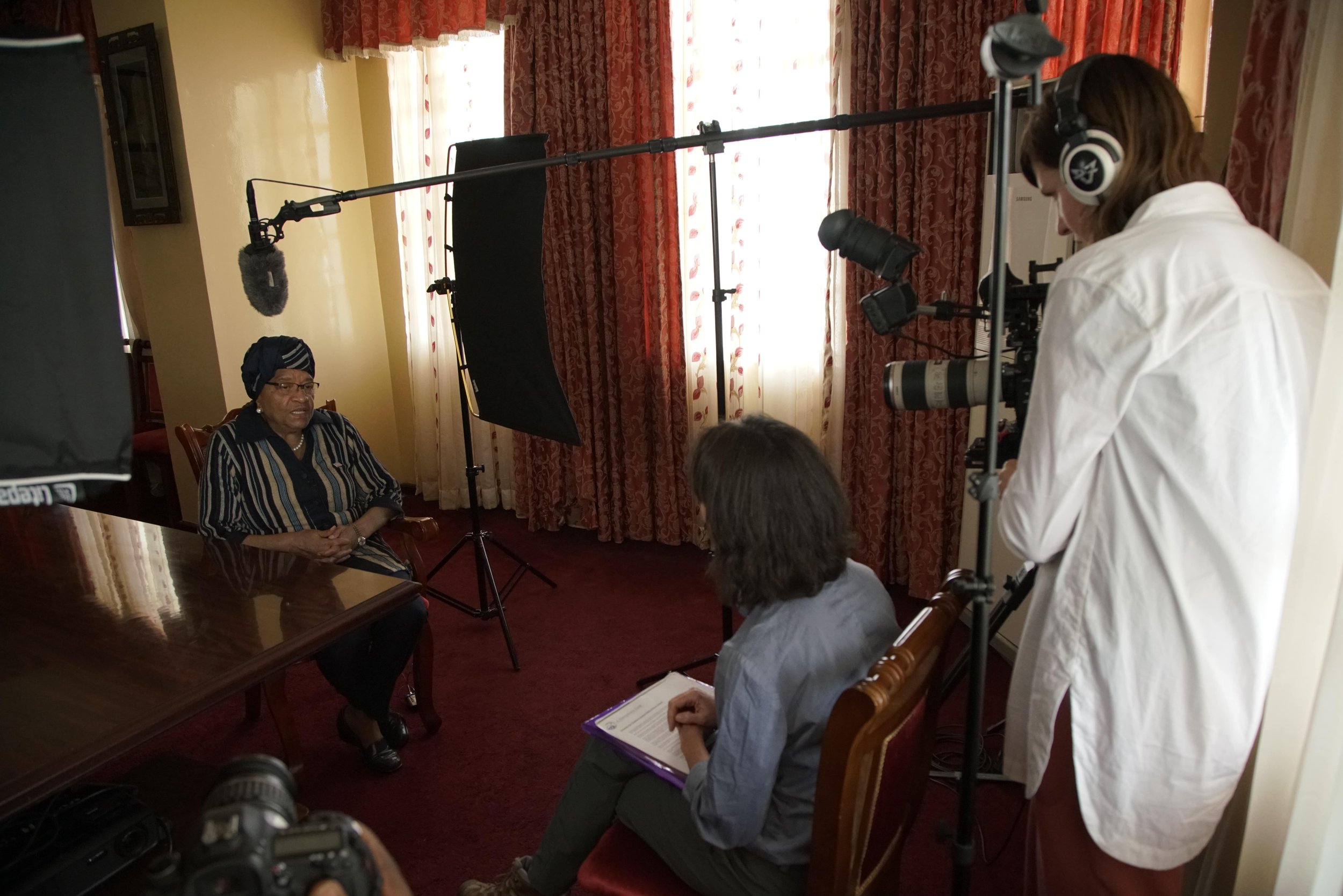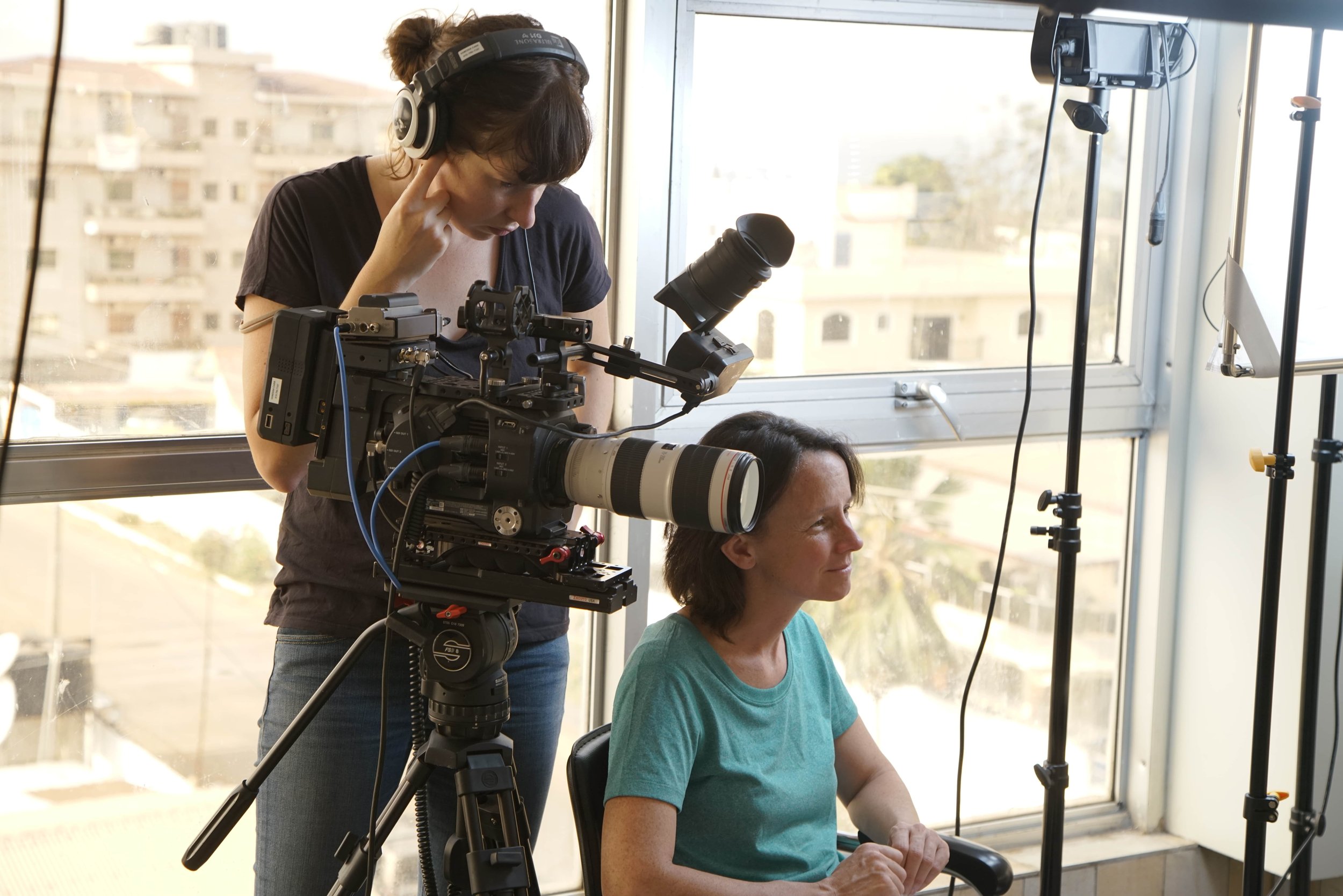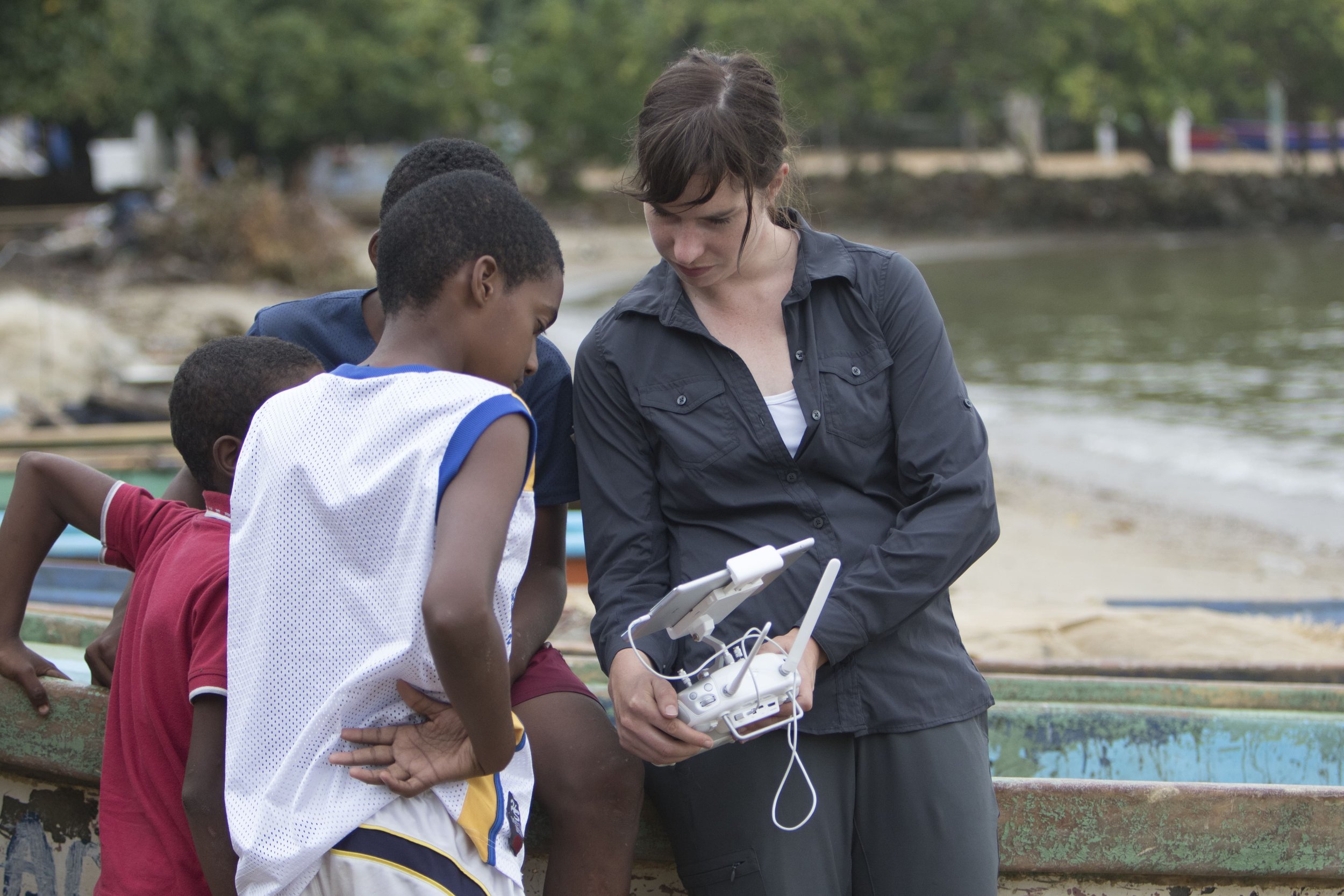Meet us
THE TEAM BEHIND THE DOCUMENTARY
Alana DeJoseph
Director
Annette Bening
Narrator
Shana Kelly
Screenwriter
Dave Steinke
Associate Producer
Vanessa Carr
Director of Photography
Joe Shaffner
Publicity
js-hero-timeline
-
Bill Josephson || Founding Voices
“Most of the Kennedy advisors… wanted to start small and be experimental, and we felt that a program of that kind was doomed to failure, that either you were going to tap into the desire for service that was represented by the Michigan students, for example, and provide something that was significant, or you weren't.”
Bill Josephson, Founding General Counsel of the Peace Corps and co-author of the A Towering Task white paper

-
Maria Shriver || Journalist, Daughter of Sargent Shriver
“Uncle Jack first spoke about the Peace Corps at the University of Michigan but Daddy was the one who actually made it real. He was the one on the ground who had to conceive of it, who had to implement it, who had to go through all the different bureaucracies, who had to go to the countries to see that American men and women could come into those countries and work in those fields. It required I think everything of him. It required his faith, it required his energy, it required his optimism, it required his diplomacy, his political sense.”
Maria Shriver, Journalist, Daughter of Sargent Shriver

-
Gerry Rice || Peace Corps Historians
"The vision and scale for the Peace Corps reflected the big ideals of the time, the belief that a grand notion such as world peace was not only attainable, but that the US could play a major role in making it happen."
Gerard T. Rice, Author: The Bold Experiment: JFK's Peace Corps

-
Charmazel Dudt || Peace Corps India Training Staff
“There has to be a lot of self-questioning. Why am I doing this? And what do I have to offer somebody who's been practicing farming for eighty years? And I'm a music major, you know, or I'm an English major. What do I know? Yeah, there has to be rigorous self-examination, I think.”
Charmazel Dudt, Peace Corps India Training Staff, St. John’s College 1965

-
Elizabeth Cobbs || Peace Corps Historians
"The Peace Corps never was easy and it will never be easy, because it was struggling with certain central dichotomies. Did it exist mainly to enable one nation to live out its own values? Or to provoke other nations to change theirs? Was it a means of demonstrating human solidarity with others' trials or was it a means of implementing solutions?"
Elizabeth Cobbs, Author: All You Need is Love: The Peace Corps and the Spirit of the 1960s

-
Juana Bordas || Returned Peace Corps Volunteer Chile
“I am Nicaraguan by birth and the United States has invaded Nicaragua several times. I mean, we can sit around here all we want and say that the United States has only helped people but that’s not history. We have a lot of healing to do with the rest of the world because the American people are good people. I had to prove myself to the community and they had to see that I was there to really serve them. Peace Corps volunteers come back and they’re a lot more savvy about what we can do to build a more peaceful world. ”
Juana Bordas, Returned Peace Corps Volunteer Chile 1964-1966

-
Ellen Johnson Sirleaf || Presidents
"It's a global village, and there is no way in today's communication revolution that you can close the doors, you can stop people from traveling. It's in our interest to keep interchanging, to keep talking, to be learning about the experience of others so that we can share information and knowledge and be able to address and respond to changing circumstances, changing global conditions."
Ellen Johnson Sirleaf, President of Liberia, 2006 - 2018

-
Jimmy Carter || Presidents
"Well, I’m glad that the Peace Corps still has the word peace in its name, which I think to me and other people, it may be a constant reminder that the United States of America, which has been involved in more wars, perhaps, than any other country on earth since the Second World War, we’ve been at war about thirty different times still have a commitment to the overall concept and high ideals of peace."
Jimmy Carter, 39th President of the United States, son of Returned Peace Corps Volunteer, Lillian Carter, and grandfather of Returned Peace Corps Volunteer, Jason Carter

-
Maureen Orth || Journalist, Returned Peace Corps Volunteer Colombia
“It took me years to understand how deeply the Peace Corps experience affected my ability to be a good journalist because it was in the Peace Corps that I really learned empathy.”
Maureen Orth, Journalist, Returned Peace Corps Volunteer Colombia 1964-1966

-
John Coyne || Peace Corps Historians
"The Peace Corps ... is mom’s apple pie. It’s positive. If you say to someone I was the director of the Peace Corps, that means you’re all right, you’re a good guy, you’re a good woman; that’s the legacy that is brought to the role by all the work that volunteers have done for fifty years."
John Coyne, Author, Editor, Returned Peace Corps Volunteer Ethiopia 1962-1964, Peace Corps Staff (1960s and 1990s), Editor of PeaceCorpsWorldwide.org, and "unofficial historian of the Peace Corps" according to Sargent Shriver

-
Harris Wofford || Co-Founder of the Peace Corps and Former United States Senator
“What other peoples most need from America is a country that understands the very complex, challenging world that we now live in.”
Harris Wofford, Co-Founder of the Peace Corps and Former United States Senator

-
Aaron Williams || Director of the Peace Corps
“Any organization that pretends it can remain static and not reform and change according to the context of the times that you live in. That’s just not possible. Obviously, we had to become more modern. I heard from Senator Harris Wofford that the target for President Kennedy was a hundred thousand volunteers per year. And wouldn’t we love to achieve that?”
Aaron Williams, Director of the Peace Corps 2009-2012, Returned Peace Corps Volunteer Dominican Republic 1967-1970

-
Altagracia Mendez de Uribe || Community Organizer
One day two young Americans appear walking down the street. I'm sweeping the house and I look and say, oh, "Who are they, what are they looking for, what do they want, here in the neighborhood? They look American, and I called my friend Amantina who lives next door, "Amantina, look what's going down the street!" And Amantina says, "And who are they?" "I don't know, but let's find out."
Altagracia Mendez de Uribe, Community Organizer, Simón Bolívar Neighborhood, Santo Domingo, Dominican Republic

-
Amantina De La Rosa || Returned Peace Corps Volunteer
“Everyone came in with different intentions. You know, we all joined for different reasons, but at the end of it everyone had the same ties with their host communities, everyone had the same ties with each other. I found that no matter where I was in Indonesia, at the end of the day [Indonesians] just wanted to see me as a human the same way that I wanted to see them in their daily lives.”
Amanda Silva, Returned Peace Corps Volunteer Indonesia 2013-2015

-
Anita Siegel || Returned Peace Corps Volunteer
“I was assigned to be the public health nursing director for a community clinic in a large valley that was surrounded by mountains and it was somewhat isolated because the roads out of there were not very good. People from all over came, and the two things that I spent the least amount of time in nursing school learning about – which was malaria and tuberculosis – were the two things that we had to deal with the most.”
Anita Siegel, Returned Peace Corps Volunteer Honduras 1974-1976

-
Antonio Gil || Journalist
“The Peace Corps came to the Dominican Republic in 1962. We were one of the first countries that volunteers came to. In 1962, our country was very different than it is today. There was a lot of poverty, about 80% of the population lived in rural areas and out in the country. The cities were small.To live in the same conditions as the community, the community came to appreciate them as one of their members and they were protected.”
Antonio Gil, Journalist, Dominican Republic

-
Baktash Ahadi || Returned Peace Corps Volunteer
“I think the impact that Peace Corps has on the communities is something that can’t be measured in a short term. It can only really be understood in the long term and what I mean to say is, in my personal case, my father was taught by a Peace Corps volunteer in Kandahar, Afghanistan in the 1960s. Because of my father’s positive experience even after leaving the country, he influenced me to join the Peace Corps and so I did and I did because I knew that Peace Corps volunteers do make a difference and they don’t necessarily make a difference that day or that time that moment that they’re in the country, but those interactions that they have with the local community that they’re serving play out, right?”
Baktash Ahadi, Returned Peace Corps Volunteer Mozambique 2005-2007

-
Brooke Marchewka || Returned Peace Corps Volunteer
“But then after the volunteer comes back it’s more important now than ever for our PCV’s to get involved with what they see as community development or local politics or just being a voice for people that are marginalized in the United States because I think as volunteers we have a unique ability to listen and to hear someone’s story and try to look at it from their side. The Peace Corps promotes cross-cultural understanding on the deepest level.”
Brooke Marchewka, Returned Peace Corps Volunteer Paraguay 2016-2018

-
Carol Bellamy || Peace Corps Director
“My vision, really, for Peace Corps was that it would continue to be that entity that actually really did help people to help themselves. It’s not “doing” for other people. It’s not, “we know better”. It’s not, “we know the answers”. It’s, “We’re here. We can learn from you. Hopefully, you can learn from us. We’re partnering with you.””
Carol Bellamy, Peace Corps Director 1993-1995, Returned Peace Corps Volunteer Guatemala 1963-1965

-
Carrie Hessler Radelet || Peace Corps Director
“I really believe that our economic prosperity and our national security and our future as a nation depends on our ability to be able to engage effectively with the rest of the world. And it’s not just the leadership of our country but it’s the citizens of our nation and so Peace Corps is one of the best ways our country engages with the world. We are training our American citizens to go out and live among and respect and understand and appreciate other cultures and then bring that back.”
Carrie Hessler Radelet, Peace Corps Director 2014-2017, Returned Peace Corps Volunteer Western Samoa 1981-1983

-
Charlie Peters || Peace Corps Washington Evaluations
"The media loved it the first few years and Shriver gave a lot of attention to getting publicity, a lot. So we had some of the smartest PR people in the Western world in that office. These were all guys who were kind of geniuses at PR and so with the natural fascination of the Peace Corps and their gift for getting the right stories in the paper—the publicity in the first year was truly fantastic."
Charlie Peters, Peace Corps Washington Evaluations 1961-1965

-
Chris Dodd || Returned Peace Corps Volunteer
“The Peace Corps, through its volunteers over the years, has been talking about these universal ideas of human rights, of decency, of fairness, of people having a right to express themselves, practice their religion freely. All those ideas that we believe are generic, and aren’t just confined to those of us who live within the borders of this country, I think advance tremendously the moral authority of a country.”
Chris Dodd, Returned Peace Corps Volunteer Dominican Republic 1966-1968, U.S. Senator 1981-2011

-
Chris Hill || Returned Peace Corps Volunteer
“I took the Foreign Service Exam while I was in the Peace Corps, then off I went to the Foreign Service, and, I think, equipped with a couple of lessons that many of my Foreign Service contemporaries didn’t have. First of all, that incredible sense of responsibility; secondly, the humility of realizing you didn’t really understand everything and you had to do probably more listening than talking and ultimately, you had to kind of be careful when you gave your advice because it may not be well-received or worse yet, it may be wrong.”
Chris Hill, Returned Peace Corps Volunteer Cameroon 1974-1976, U.S. Ambassador 1996-present

-
Donna Shalala || Returned Peace Corps Volunteer
“I think that living in a mud village without much running water or electricity for a couple of years made a difference in my experience. But teaching young men and young women in an agricultural college, understanding their backgrounds, understanding their passion about the future, about their own futures, about what they expected from both their country and within their own families, I just learned a lot. I learned how to listen more than anything else. And I learned a lot about different cultures. And that became absolutely critical for the rest of my career.”
Donna Shalala, Returned Peace Corps Volunteer Iran 1962-1964 , U.S. Representative 2019-2021

-
Fatimah Saleem || Returned Peace Corps Volunteer
“Well, most people that’s not in Peace Corps can’t understand why you’re giving up two years of your life to go and work for nothing. They can’t understand how you could live over there in those huts. I tell them, no, let me explain. People do live in huts but not most people, not anymore. The world is developing. It’s not standing still. And I tell them, “I don’t mind going. I love going.” And they say, “And you’re not afraid,” Afraid of what? And then they’ll start talking about the snakes. I said, “I grew up in Florida. I don’t think no place on earth can have more snakes than Florida.””
Fatimah Saleem, Returned Peace Corps Volunteer Botswana 2009-2011, Eastern Caribbean 2003-2004, Malawi 2000-2001, Mozambique 1998-2000

-
Iryna Krupska || Training Manager Peace Corps
“We like to say that Peace Corps is a “people-to-people organization”. When American volunteers come here and then twenty-seven months of service side-by-side, shoulder-to-shoulder with Ukrainians, their Ukrainian colleagues, students, community members, when they come and live as just normal people and communicate with Ukrainians on a daily basis, that gives more to Ukrainians than, I believe, tons of money.”
Iryna Krupska, Training Manager Peace Corps Ukraine 2003-2017

-
Jackie Spurlock || Returned Peace Corps Volunteer
“I have just come from a conference sponsored by Peace Corps Iran Association called, ‘Iran Today, Quest for New Narratives’ and in putting that together we looked for other narratives, other ways of thinking about Iran. I think that a few well placed volunteers developing memorable bonds is the way Peace Corps works and I think the remnants of that are still there in Iran and I’d like to see that started up again eventually.”
Jackie Spurlock, Returned Peace Corps Volunteer Iran 1974-1976

-
Jason Carter || Returned Peace Corps Volunteer
“In Zulu, they define ubuntu, which is humanity, like this. They say ”Umuntu ngumuntu ngabantu” which means, “A person is a person through other people.” I think the lessons from the Peace Corps are real for me almost every day. Being in the state senate, running for governor of my state, being involved with the Carter Center, I get called on to speak in a variety of contexts. I get called on to meet a host of different kinds of people and I think in every single speech and in every single interaction with another human being, I think about and am impacted by what I learned in the Peace Corps.”
Jason Carter, Returned Peace Corps Volunteer South Africa 1997-1999

-
Jersey Garcia || Returned Peace Corps Volunteer
“I went there to change the world, to be the shero and actually they, that experience changed me. I feel that the community or that experience of being in Honduras helped me more as a professional and also as a human being, just to be able to relate to others. The same communities, or the same individuals, family members even of the individuals that I lived and worked beside in Honduras are living here in Miami.I'm living that exchange with that community here, with the food, with being able to relate to them when I say, you know, I know that town. You know, I've been there. I was there. Oh, I remember how hot it was or I remember this little store that was in the corner and their eyes just light up, because they never thought that someone that is not from their country, will remember, will know these little spaces or will remind them of their own communities back home.”
Jersey Garcia, Returned Peace Corps Volunteer Honduras 1998-2000

-
Jody Olsen || Returned Peace Corps Volunteer
“Peace Corps to me is so relevant because so much of the information that goes back and forth that we see isn’t correct. We have too much information and not a lot of it is correct and to be able to talk about real experiences and real life that are connecting real people is a gift that I think needs to continue to be given through Peace Corps.”
Jody Olsen, Returned Peace Corps Volunteer Tunesia 1966-1968, Peace Corps Chief of Staff 1989-1992, Peace Corps Deputy Director 2002-2009, Peace Corps Director 2018-2021

-
Joe Kennedy || U.S. Representative
“If you look through our State Department ranks, look through the ranks of international development organizations, you’ll find an awful lot of former Peace Corps volunteers.
Joe Kennedy, U.S. Representative 2013-2021, Returned Peace Corps Volunteer Dominican Republic 2004-2006

-
John Garamendi || U.S. Representative
“It oriented us to the world, and to the needs of the world. And looking at the world out there, we also saw the United States, and we were able to observe the United States from afar and understand that many of the issues of the world are the issues of the United States. Sometimes we cause the problem. Sometimes we're the solution to the problem.”
John Garamendi, U.S. Representative 2009-present, Returned Peace Corps Volunteer Ethiopia 1966-1968

-
Juliane Heyman || Peace Corps Training Staff
“I thought, the Peace Corps sounds interesting, because I've been through the war in Europe in the 1940s and knew what war was like. I thought even the word “Peace” even though I didn't quite know what we were going to do attracted me tremendously.”
Juliane Heyman, Peace Corps Training Staff 1961-1966

-
Kirby Jones || Returned Peace Corps Volunteer
“The majority of us were English majors, history majors, political science majors. We were twenty-two years old; we knew nothing about the world or about anything. and they said to me, “Where do you want to work?” I said, “I’ve been in this country twenty-four hours. I haven’t got a clue what this map is all about or anything.” And he said, “You can work anywhere above this line,” and drew a line across the middle of the city. And I literally went like that and put my finger on a place and he said, “That’s where you’ll work.” I said, “Where do I live?” He said, “Find a house to live in.”
Kirby Jones, Returned Peace Corps Volunteer Dominican Republic 1963-1965

-
Kul Chandra Gautam || Assistant Secretary-General of the United Nations
“The world at the moment seems to be becoming more inward-looking, more hyper-nationalistic. And that is not a good thing. Because in today’s world, we are going to swim or sink together. And therefore the feeling that we live in a common world with common problems, common aspirations, that is even more important today to inculcate that value particularly among our children and the younger generation. It is even more important today than ever before. And that’s where I think the Peace Corps, the Peace Corps volunteers, the Peace Corps concept becomes an antidote to this inward-looking self-contained world.”
Kul Chandra Gautam, Assistant Secretary-General of the United Nations, Deputy Executive Director of UNICEF 2000-2007

-
Leah Ward Sears || American jurist and former Chief Justice
“My husband was in the second group. I think it was an awakening for him. For my daughter who was in the Peace Corps in 2009, it was more of an educational experience. My, my uncle was in the very first Peace Corps group. It was even a different experience for him. As our world gets smaller and smaller we really need to understand people who on the outside, at least, don't look like we do, don't act like we do, but nevertheless are really who we are.”
Leah Ward Sears, American jurist and former Chief Justice of the Supreme Court of Georgia

-
Lex Rieffel || Returned Peace Corps Volunteer
“To me you will never prove the value of the Peace Corps with numbers, never. The best way of demonstrating the value of the Peace Corps, I believe, is stories.”
Lex Rieffel, Returned Peace Corps Volunteer India 1965-1967, Non-resident Senior Fellow The Brookings Institution













